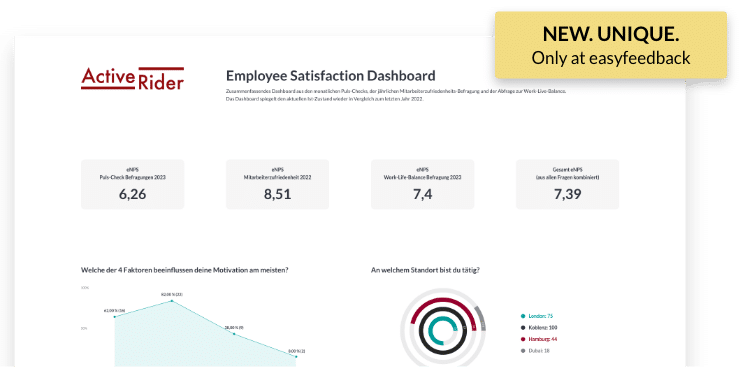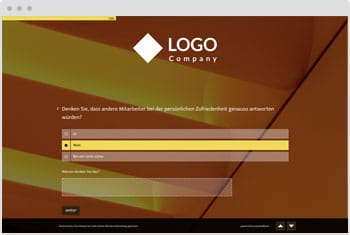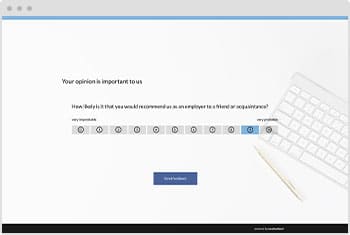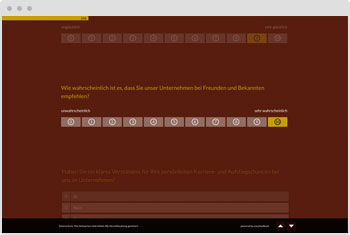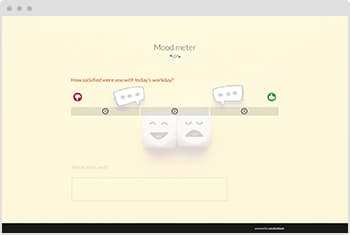Measure your company's culture with a survey

With our ready-made survey template, you can measure and evaluate how strong your company culture is to retain employees for the long term and increase your performance and job satisfaction.

“Identifying customer needs is an essential part of our business. easyfeedback accompanies us for many years as a loyal partner in this task. We particularly appreciate the intuitive usability of the survey tool as well as the professional support.“
Guild Lead User Experience Research

“We use easyfeedback for internal and external surveys – fast, comfortable and really easy! Straightforward and cordial support can always create a smile. We really appreciate the permanent development of the platform.“
Guest & Competitor Insights Analyst
Content and targets of this company culture template
Success and corporate culture go hand in hand. Many corporations have recognized this and have given corporate culture an increasingly important role.
According to a study by Shiva Rajgopal , an accounting professor at Columbia Business School, more than 90% of respondents consider corporate culture to be important. 92% even said that they believe improving their firm’s corporate culture would improve the value of the company. In addition, 50 % of respondents said corporate culture influences productivity, creativity, profitability, firm value and growth rates.
So what about their culture? Is the company culture strong enough to provide employees with a positive work environment, retain them longer, and keep engagement and performance levels high?
You can easily measure your current organizational culture with an employee survey. Get feedback from the people who are surrounded by your culture every day. The feedback will help you understand what your current culture looks like, whether there is a need for action in specific areas, or whether you need to initiate a complete culture change.
Try it out and get valuable feedback for your success.
Content:
• Asking for willingness to recommend
• Job satisfaction questions
• Feedback on corporate tasks
• Evaluation of internal communication
• Feedback on superiors
• Feedback on work atmosphere
• Questions about working conditions
• Questions about work-life balance
• Question on willingness to recommend the company as an employer
Goals:
• Measure current status
• Discover optimization potential
• Retain employees in the long term
• Increase motivation
• Increase job satisfaction

Data privacy protection „made in Germany“ (GDPR)

Anonymity functions for open feedback
Almost everything you need to know about the company culture
1. What is a corporate culture?
A corporate culture is a system in which values, norms and attitudes are shared and lived out in the organization. It influences how a company and its employees act, make decisions and behave towards each other and towards external parties. A corporate culture shapes the personality of a company, so to speak, which is reflected in its success, in the willingness of its employees to perform, and in their satisfaction and loyalty.
2. Why is corporate culture important?
A company’s success depends to a large extent on its culture and the people who live it. This means that whoever succeeds in integrating an organizational culture in which employees feel comfortable and identify with the norms and values that are lived out, will not only have satisfied employees, but also employees who are willing to perform. This willingness to perform is reflected in the achievement of corporate goals and thus also in the success of the company.
However, corporate culture is not only an important building block for the success of a company, but also for employer branding.
A positive organizational culture ensures that employees are satisfied with their employer and communicate this to the outside world. This leads to a better employer image to attract new talent and retain employees in the long term.
3. Which factors are part of a company culture?
Several factors play an important role in corporate culture and have an impact on have an impact on the entire day-to-day operations.
1. Joy
When employees bring fun and enthusiasm to the workplace, it not only increases their performance, but also their sense of well-being. They enjoy coming to work and make a significant contribution to the company’s climate through their positive attitude and cheerfulness on a daily basis.
2. Relationship
Human connection and mutual trust are the basis for a good relationship. Sincerity, teamwork and loyalty bind employees and managers in the company and strengthen the interpersonal relationship. This influences the culture of a company as well as the working atmosphere.
3. Learning
If the work environment is open to new methods and ideas, and places value on promoting and training employees, then learning is a factor that also has a positive effect on the corporate culture in everyday work.
True to the motto: Get out of the old rut and into the adventure.
4. Performance
Economic success and the achievement of goals shape employees and managers in the corporate culture. Every working day performance is crucial for results and profits.
5. Authority
Leaders are leaders, coordinators, purposeful and, at their best, should be emphatic. They are responsible for achieving the results and goals of the organization, lead their employees and decisively shape the lived corporate culture with their leadership style.
6. Order
Well-structured, respectful interaction as well as living and sharing common norms create the order in a defined corporate culture that is reflected in the organization on a daily basis.
4. What types of corporate culture are there?
In 1983, the researchers Cameron & Quinn found out in an extensive study that the success of a company is strongly based on the culture of the organization, as values, norms and attitudes are lived and shared by the employees in the company. From the study, the previously mentioned researchers were able to identify different types of lived corporate cultures.
What these are and what is behind the defined culture, we have explained in more detail below:
1. Clan/Family-like culture:
Clan culture is a very friendly and family-like form of organization that focuses on meaningful interpersonal relationships and collaboration. The future of a company is to be shaped together. To that end, engagement and people development is a long-term component of the culture. The executive or leaders of the organization are seen as mentors and possibly even father figures in this process. Loyalty, teamwork, tradition and trust are characteristics that define this form of organizational culture.
2. Market/Performance culture
This type of organizational form is a performance and results-oriented culture that is all about competition and achieving business goals.
Market dominance and business results are the focus of this culture. Through clear goals and tasks, employees should be managed and be rewarded according to their success. Control and stability structure the organization. Managers are drivers, producers and competitors at the same time. The pursuit of success is the bonding agent of the organization.
3. Hierarchical culture
In hierarchical culture, organizations are structured by responsibility and role. Stability, control, and a smooth flow in tasks and processes are the focus in this organizational culture. Success is defined in the context of reliable delivery, smooth planning, and low costs.
Managers are the focus, as they must be good, efficient coordinators and organizers.
4. Adhocracy culture
This form of corporate culture focuses on creativity and idea generation. Often applied to companies in the technology industry, employees are encouraged to come up with new ideas for new products as well as improvements to existing products. In this organizational culture, a supportive work environment and agility are necessary to drive further development and keep the company competitive.
5. What are the factors influencing corporate culture?
1. Globalization & Internationalization
The global and international orientation of the economy, which is increasingly leading to greater and more complex interconnectedness, is a factor that has an impact on corporate culture.
Economic and social changes happen faster due to interconnectedness, and ways of working are increasingly adapting to increasing digitalization.
As a result, organizational culture is also changing over time.
2. Performance society
The pressure on employees to perform and the associated mental stress have increased. This has a negative impact on health, motivation and performance. More absenteeism or fluctuation are consequences of this performance society and also have an impact on the organizational culture.
3. Demographic change & equality
Another influencing factor is societal changes, later retirement and the ever-increasing proportion of women in the workforce mean that companies have to restructure and adapt culturally. In addition, they have to make their personnel decisions differently in the medium and long term.
6. What makes a good company culture?
A good corporate culture is characterized by the fact that the organization achieves its defined goals for economic success, is able to retain and retain employees even in times of crisis, and that employees feel comfortable in the culture they live.
You are in professional company







easyfeedback welcomes more than 740.000 participants per month
